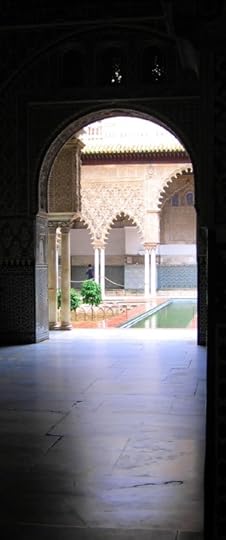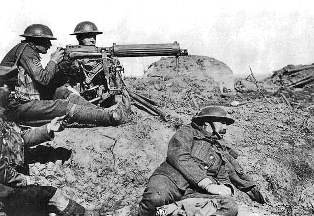Sue Burke's Blog, page 67
July 9, 2014
“Game of Thrones” in Seville

I took this photo during a visit. It shows the entrance to the Damsels’ Patio.
Built in the 11th and 12th centuries, and added onto in the 14th, the Seville Alcázar could be described as a mini-Alhambra, filled with Islamic, medieval, and mudéjar architecture. It belongs to the royal family of Spain, and they occasionally use it for official business.
Seville’s mayor hopes that when HBO shows the world what the city has to offer, tourists will come. I know they won’t be disappointed.
Every time I’m in Seville, I visit the Alcázar. Once, as I toured its halls and chambers, I realized I was completely lost. I was about to look at the floor plan, then I stopped. I was lost in one of the most gorgeous buildings in the world. I was in no hurry. What could be better than to continue wandering aimlessly and enjoying whatever delight I came upon next?
It doesn’t get any better than that. Come see for yourself.
— Sue Burke
July 4, 2014
Felipe VI, Superking?

Madrid’s mayor called on its residents to decorate their balconies with the flag to show support for the new King. A few in my neighborhood did, but most balconies went unadorned.
His new Majesty looked happy at the brief, “austere” ceremony, but that probably won’t last long. He’s already been called a dynamic force, a hope, fresh air – and a scapegoat.
These days all institutions have lost prestige, and the Crown has long been associated with the Catholic Church and politicians. Both poll poorly in Spain. Felipe left out a Bible, crucifix, and Mass from his proclamation, but he’s stuck with politicians.
The Constitution specifies (Article 64): “The acts of the King shall be approved [refrendados] by the Prime Minister of the government and, as necessary, by the appropriate ministers.” They even approve his speeches, which is probably why his and his father’s have always avoided controversy and the merest hint of inspired rhetoric. We don’t even know what Felipe really thinks.
Felipe could be a superman – he received excellent preparation for his new job – but he’s wrapped in Kryptonite chains. He’s subject to politicians who at best achieve mediocrity. Prime Minister Mariano Rajoy earns a confidence rating of 23%, while Felipe got 58% right after taking the throne.
A lot must be done:
• Revitalize Spain’s political institutions. If the United States were like Spain, Barack Obama and Mitt Romney would have hand-picked the candidates for Congress and Senate for their parties – no primaries, just backroom deals. Obama and Romney would pick their successors. This has been going on in Spain for decades: Tammany Hall and Boss Tweed at all levels of government. Corruption is rampant, and no one in office, from municipalities to the Prime Minister, has to care about what citizens think or want.
Not one word about corruption appeared in Felipe’s speech at his proclamation.
Articles by my friends Alana Moceri and Fernando Betancor get a little deeper into Spain’s problems with democracy.
• Revitalize the economy. Between 2007 and 2011, the poorest Spaniards lost 42.4% of their income and now earn €2,685 per year, while the richest 10% saw a 5.6% decrease, and the top 1% lost hardly anything, according to the OECD. This was the largest increase in inequality among the world’s 30 most advanced countries. Unemployment is still around 25%. The one thing that could save the economy in the long run is education, which is systematically being undercut both in finances and policy.
The word “unemployment” did not appear in Felipe’s proclamation speech.
• Negotiate a solution to the Catalonia independence movement. A survey taken right after Felipe’s proclamation found that 90% of respondents agreed that “what is really urgent now is to have the different political powers engage in dialogue and search for pacts and agreements to solve the country’s current problems.” They want him to intervene to persuade politicians to sit down and talk about this and other issues. But Prime Minister Rajoy has expressed reticence to the King’s involvement.
• Reform the Constitution. Properly done, this could solve many problems and serve as a “Second Transition.” Felipe’s father, Juan Carlos, guided the country through the Transition from the Franco dictatorship to democracy 39 years ago. Juan Carlos could make things happen back then because he had real power until he had a Constitution written and placed himself under it. Now the King is limited to “arbitrating and moderating” the function of its institutions. But a lot of political deals had to be cut in 1978, and the weaknesses of the Constitution and its institutions have become clear. Unsurprisingly, politicians don’t want to open that can of worms.
That’s why pundit José Ignacio Torreblanca warned of the temptation to expect the new King to implement a “Second Transition,” and said that Felipe “ought to avoid the role of superhero.” The King might be able to provide momentum, Torreblanca said, but it will take the efforts of the entire society to carry out the change.
But how can society change things if its political system deliberately stymies change?
What about a republic – no king at all? Thousands of people have protested for a republic since Juan Carlos announced his abdication. Yet, when polled, 62% want a referendum on the monarchy, but only 36% would vote for a republic. People just want a say in their government.
In the end, that’s the issue. People want more, better democracy. Better government. They hope Felipe VI can somehow change the course of the nation. But will he have the freedom to act? Or will he be under the thumb of bad politicians, just like everyone else?
I worry that if we have to ask, the answer is no.
— Sue Burke
Also posted at my professional website,
July 2, 2014
Intralingo interview

When I say I’m a literary translator, what does that mean? How did I get started? What’s the best and worst part of the work, and what have I done?
For the answer to these and other questions, check out my interview today at Intralingo Spotlight, hosted by Lisa Carter:
http://intralingo.com/spotlight-on-literary-translator-sue-burke/
— Sue Burke
June 26, 2014
Tribute to Maya Angelou

Celebrate the art and activism of Maya Angelou with a multimedia tribute of music, film, and poetry presented by Casa de America in collaboration with Democrats Abroad Madrid.
Time: 7:30 p.m.
Date: Monday, June 30th
Place: Casa de America
Plaza de Cibeles, 2
Madrid
Free admission. In Spanish and English.
More information here: http://www.casamerica.es/literatura/homenaje-maya-angelou
I will be reading one of her poems, “A Brave and Startling Truth,” written on behest of the United Nations. I’m part of a talented team of actresses, musicians, writers, and poets, and a hard-working producer. We don’t want her passing to go unnoticed.
From the press release:
Over the course of a career that spanned six decades, Maya Angelou’s art and activism left an indelible mark on both America and the world. She was at times a poet, author, film director and producer, journalist, dancer, lecturer, and above all a consummate humanist. Her contributions to the US civil rights movement and feminist movement, among other causes, were invaluable to our progress both as a society and as individuals, and she may be best remembered for helping to shape our national consciousness and direct our common moral compass towards empathy.
We will be paying tribute to this amazing woman through a multimedia presentation that will include readings of her poetry and prose, music, film of Maya herself, and commentary by two recognized experts in contemporary American literature. It will be great fun with a little blues and gospel music added for your pleasure.
— Sue Burke
June 23, 2014
Open mic in Madrid on Tuesday

Come to the Madrid Writers Open Mic at 8 p.m. Tuesday, June 24 – tomorrow! – at the café-bookstore El dinosaurio todavía estaba allí, calle Lavapiés 8.
Enjoy poetry, short stories, flash fiction, spoken word and non-fiction in English and Spanish. I will be reading my essay, “Why You Have a Future,” which contains some sort of logical fallacy, but I don’t care.
About the name of the café: It comes from the micro-story “El dinosaurio” [“The Dinosaur”] by the Guatemalan writer Augusto Monterroso, published in 1959, which until recently was considered the shortest short story in the Spanish language:
Cuando despertó, el dinosaurio todavía estaba allí.
When he (or she or it) woke up, the dinosaur was still there.
The title for the shortest micro-story in Spanish is now held by Mexican author Luis Felipe Lomelí for a work published in 2005, called “El emigrante” [“The Emigrant”]:
«¿Olvida usted algo?» «¡Ojalá!»
“Have you forgotten something?” “I wish I had!”
— Sue Burke
June 18, 2014
Go Ahead — Write This Story: Control
Do your characters truly control their fates? Here are some story ideas, in case you need some:
• In this memoir-like story, an octogenarian imagines how life could have been if a series of worldwide changes had gone differently.
• This first contact story begins with the realization that in its cultural exchange with Earth, Aldebaran B has sent its malcontents as a form of exile.
• This is a suspense story about a medical treatment that can rehabilitate stroke victims or create false memories, and a patient who had the therapy isn't sure why.
— Sue Burke
June 8, 2014
A Jay Lake story
My story is small.
At the same time he was suffering through his slow death from cancer, so was my sister. He spoke very freely about symptoms and troubles, often the same as hers, which she and I talked about. It made her feel less alone. One day she had a specific question, so I asked it as a comment to a post on his blog. He answered promptly and honestly, with useful suggestions and best wishes.
It’s not much of a story, but it tells one true thing about Jay. He did not know me at all, much less my sister, but he was always glad to help anyone any way he could.
I’ll miss him.
— Sue Burke
June 4, 2014
WWI: What we’re still fighting

Why did they fight? Nationalism, for one thing. That ideology even emerged strengthened by the war, and it has kept causing more wars ever since – and despite the continued bloodshed, most people today consider nationalism right and logical. It seems identical to patriotism, but nationalism differs from patriotism in one small cancerous way. Patriotism means pride in your country, but nationalism limits who can be part of your country.
The French Revolution gave the ideology a kickstart two centuries ago, and eventually author Maurice Barrès, in the throes of nationalism, insisted that instead of being “citizens of humanity” its inhabitants should strive to be “Frenchmen of France,” a goal he thought of as more noble but was also smaller in striving and scope.
Nationalism celebrates a glorious past and it defines a nation as something composed of a single people who share a language, tradition, culture, geography, race, folk-tales, legends, national heroes, music, religion, and future. (All of which can be invented or at least consolidated if necessary.) Finally, nationalism says that a people – because it is a “nation” – deserves its own sovereign independent state.
What’s wrong with that? Edmund Burke (no relation) saw nationalism as the end of individuality. “The state is all in all,” he said, because under nationalism the state defines your language, culture, race, heroes, religion, favorite foods, and memory. The government gets the power to tell you who you are, and it can enforce that identity by law – if necessary, at the point of a gun.
In addition, it almost always teaches you that your nationality is superior to the rest and your nation is under threat by lesser nations, so you need a strong military. Since you are superior and have military might, you can and should expand your borders and colonize inferior people for their own good (and your own good, if they have nice resources). This is why Francois Mitterrand said, “Nationalism is war.”
But most dangerously of all, nationalism tells you who does not belong, who is the “other” and must be eliminated.
The idea of nationalism spread from France across Europe during the 1800s: to the Slavic people in the Balkans and, among other countries, to Germany. German nationalism was anti-French. French nationalism was anti-German. Both were anti-British. In Germany, nationalist antisemitism arose at the end of the 1800s claiming that Jews, a convenient “other,” were an exploiting, corrupting, and alien influence that would weaken the nation – and this idea turned genocidal in the 1930s and 1940s.
You can see where this is going.
Yet not every country has to succumb to this. The United States of America is one of several countries founded on a civic rather than nationalistic union. Its Constitution deliberately outlaws a national religion, a radical concept at the time of its drafting and still controversial now. It permits both anyone born in the country and immigrants to become citizens – not every country permits that. The founding philosophy glorifies freedom, tolerance, equality, and individual rights, and the United States has spent its existence trying to refine these ideals – again, not ideals that every other country shares.
World War I ended with the creation of seven new countries, but they always held minorities within them. One of those new countries was Yugoslavia. They were all Slavs, but they didn’t speak the same language or share the same faith, and this finally led to yet another nationalist war. Twenty years ago, Sarajevo was under siege, and thousands were dying from constant bombardment and sniper fire.
Right now, people are dying in the fight between Ukraine and Russia, one of many nationalist struggles underway in the world. Some of these fights remain political, others sometimes turn violent and even genocidal.
This is why when I hear people in the United States complaining about “Push 1 for English” as if it were an affront to the country to have several languages coexist, I despair. This is not patriotism. It does not reflect the founding principals of the country. It attempts to define the country by its language, as if the United States were France or Russia, as if those two countries were following a wise course. Instead, it is a tiny but toxic step down a well-trod nationalistic path that eventually leads to a sea of blood.
The military learned a lot from World War I. Civilians came away with the wrong lesson.
— Sue Burke
Nouriel Roubini also discusses this at Project Syndicate.
May 24, 2014
Champions tonight!
Jorge Luis Borges said, “Soccer is popular because stupidity is popular.” I can prove that -- the part about stupidity, at least.
Tonight, Real Madrid and Atlético de Madrid will play each other in Lisbon for the UEFA Champion’s League 2014 final. Yes, both of Madrid’s soccer teams came out on top of all Europe’s best professional teams, and one of them will win the big game tonight.
Excitement reigns in Madrid. (And in Lisbon.) Tonight the stadiums for both teams here in Madrid will be open to the public and will show the game on big screens so their fans can enjoy the excitement in good company.
In addition, the head of the regional government thought about putting up a big screen in Sol, a downtown plaza, so all fans could come and watch, but the municipality, which controls the plaza, objected. A city official asked if it would occur to anyone to put fans of rival teams together in the same space in any other city in the world. Common sense said no. In addition, the two politicians are in the same political party, which is subject to wild infighting these days, and putting those factions in the same space is equally unwise. So that big screen won’t happen.
Then, tradition calls for the fans of the winning teams to celebrate around either the Fountain for Cybele for Real Madrid, or the Fountain for Neptune for Atlético. However, tomorrow is an election day, and the law forbids any sort of electioneering on the day before an election, and a public gathering could run afoul of that. Someone might discuss politics.
So the city consulted with the Election Junta to see if the celebrations would be okay – and, for that matter, the screens in the stadiums. The Junta said the stadiums are closed, private spaces with security, so they won’t effect the election. The formal celebrations at the fountains are scheduled for after the polls close tomorrow, so they will have no effect on the election.
The informal celebrations at the fountains right after the game tonight would be impossible to stop, so the Junta has ignored that question entirely.
Politics has been certified safe from soccer. Or vice versa. Hard to tell.
I’ll be cheering for Real Madrid, but if Atlético wins, I’ll be happy for their fans, who have been loyal through some hellish setbacks in recent years. I also know that whoever wins, I’ll hear the celebrating far into the night. But no politics, please.
— Sue Burke
May 21, 2014
Go Ahead — Write This Story: No change
If you need some changing story situations, here are a few ideas:
• This is a story about an escape plan that would have been perfect, but Herbert was the same outside of confinement as he was in it.
• This is a high fantasy story about a wise sorceress who solves a series of increasingly difficult confrontations with evil, but her skills do not increase as the danger increases.
• This is a steampunk story about a loyal minion — or rather, told from the minion’s point of view as other characters go about their thrilling, life-altering adventures.
— Sue Burke



